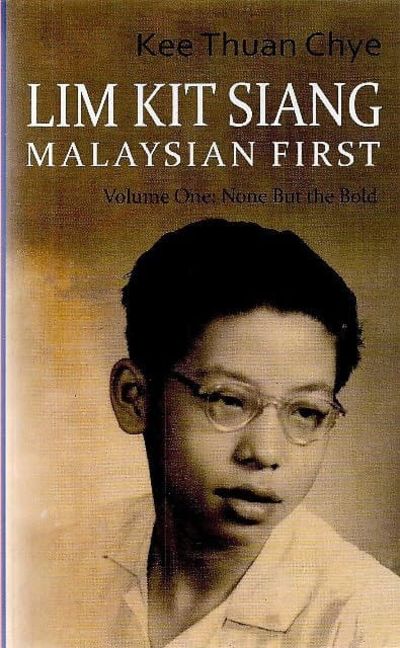Book review by Sebastian Lim

Title: Lim Kit Siang – Malaysian First: Volume One: None But the Bold
Author: Kee Thuan Chye
Publisher: Landmark Books
ISBN: 97811822032
None But the Bold tells the story of the outspoken politician as well as the private family man.
The book is full of drama, humour and heartfelt confession of a man who has dedicated his life to fight for the betterment of his fellow countrymen.
It recounts the battles Lim won and lost, the betrayals he suffered and the sacrifices he made. It also explores the deep bond he shares with his family, friends and comrades.
Above all, it gives an insightful understanding of what makes Lim Kit Siang tick, both as a public figure and the private person behind the facade of a politician.
An icon of the Democratic Action Party (DAP), Lim is much misunderstood at times. To some, he is a malignant person because his political opponents falsely accused him to be anti-Malay and anti-Islam and also a communist.
To his supporters, he is the heroic fighter for democracy and also champion for a country for all Malaysians, regardless of race or religion.
He is a visionary who has dedicated his life to pursuing his dream of a multiracial, multilingual and multicultural Malaysia.
Unfortunately, the public sees only the demon, not the man.
Dramatist-journalist Kee Thuan Chye offers readers an insight of Lim, from his early years as a precocious youth to his venture into politics and beyond. Kee’s writing humanises Lim in ways that readers can appreciate the man that he is, looking beyond the persona that has been created by the press and his critics.
Lim showed his leadership qualities from an early age in school. He would often take on leadership roles in the school extra-curricular activities. He started a class magazine called The Light and later The Phoenix when he was in Form 3.
As the editor, he penned articles to encourage students to think and voice their thoughts. He was also editor of the school magazine, The Pilot.
He was appointed deputy head prefect, chairman of the Science Society and was active in the debating society. These were the growing years where Lim cultivated the skills needed for public speaking and skillful writing for his eventual entry into politics and becoming a career politician, although his father wanted him to continue his studies to be a doctor.
When Lim decided to marry Yok Tee at that time, without his parents’ blessings, they cut off all financial support for him. He left the English College after two months and took up a temporary job teaching English at the Senai Chinese Primary School to support himself. It was after the birth of Guan Eng that Lim’s parents reconciled and continued to support him financially.
It was also at that time that Lim was offered a cadet reporter job at The Straits Times Singapore. There, Lim was elected head of Singapore National Union of Journalists, then later national secretary-general of SNUJ at the age of 22. That was when he met C.V. Devan Nair, then head of NTUC.
Lim’s life took another change when Devan Nair, who was MP for Bangsar, offered him a job as his political secretary after Singapore had separated from Malaysia. Lim accepted the job immediately. And got scolded by his parents for “throwing away the rice bowl”.
When the Democratic Action Party was formed, Lim was among the first batch to join as members. The party launched its official publication, The Rocket, with Lim as its editor.
On the May 13 riots, Lim was unjustly blamed for inciting it although he was not even in Kuala Lumpur that evening. He was speaking at a rally in Kota Kinabalu in Sabah. The May 13 riot was dealt in depth in the book, offering some interesting revelations.
During his detention after May 13, Lim decided to study Law. He enrolled as an external student pursuing a Bachelor of Laws degree (LLB) at London University. He was called to the Bar in 1977.
Lim has been called a dictator many times for his decisive and firm actions as the Secretary-General of DAP. But he took it all with a mixture of resignation and jocularity.
As a victim of the Internal Security Act (ISA), Lim called for its repeal repeatedly as the Act “offends the rule of law and natural justice”. It was finally abolished on Sept 15, 2011, but was subsequently replaced with the Security Offences (Special Measures) Act or SOSMA in 2012.
He also called for the repeal of the Sedition Act, which had been amended and expanded in 1970.
In October 1987, Lim was arrested with his son, Guan Eng, then a young entrant into politics with his election as a parliamentarian the previous year under Operation Lalang. They were the last of the ISA detainees to be released 18 months later.
Sebastian Lim is an experienced journalist and editor who now runs his own book review blog – coolreadsseb.blogspot.com. The views expressed here are those of the writer and do not necessarily reflect that of The Weekly-Echo.
WE